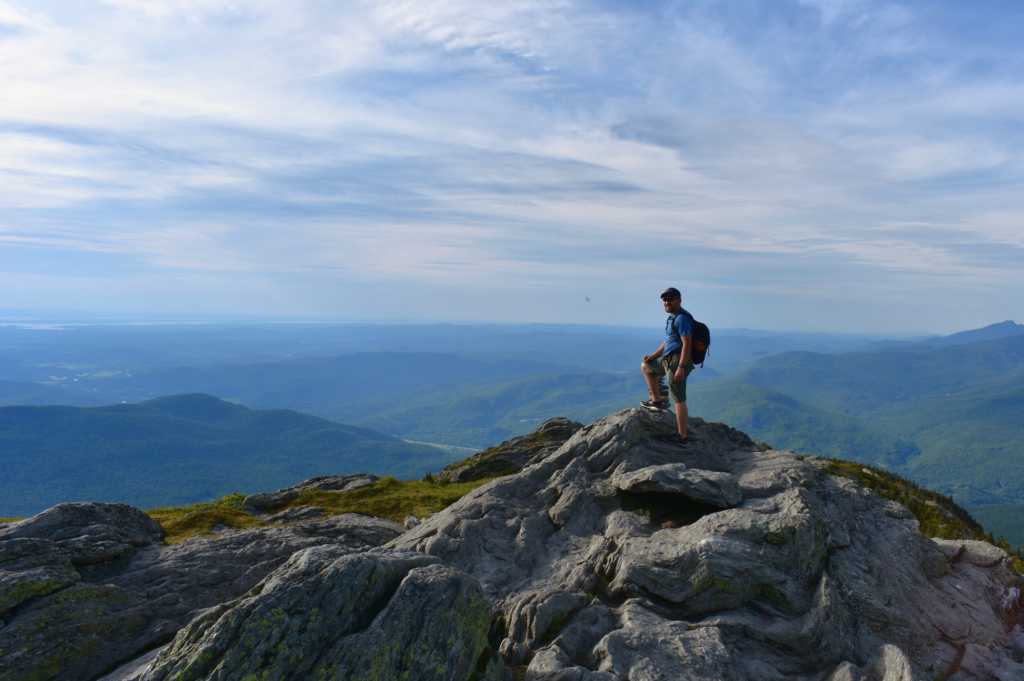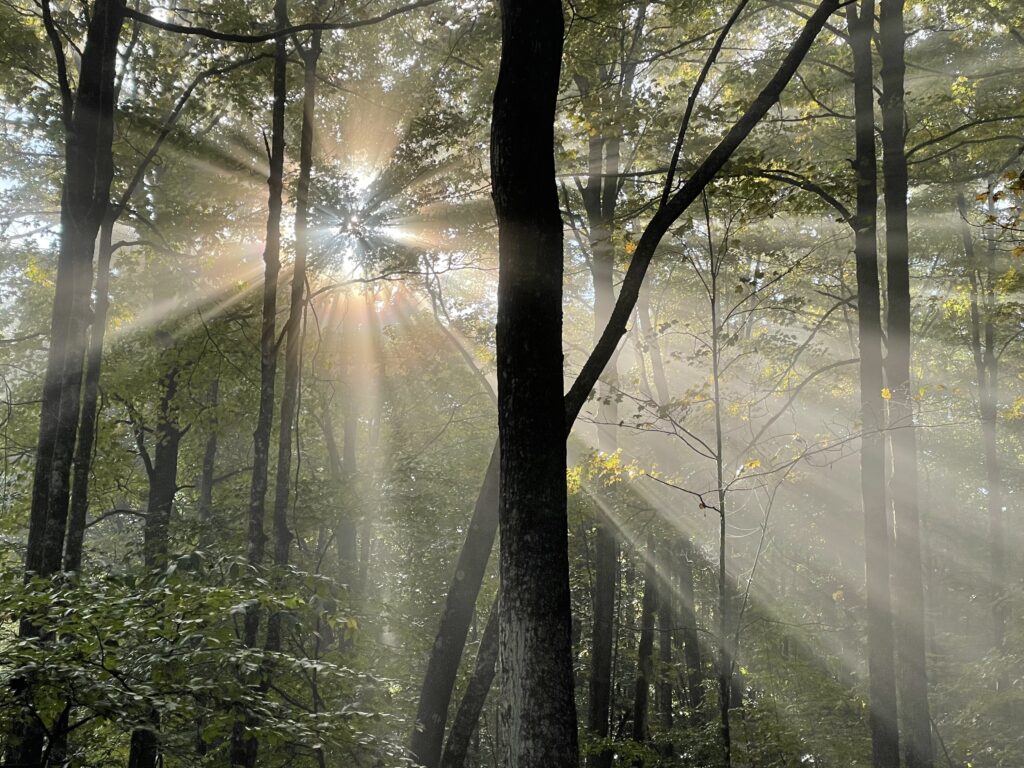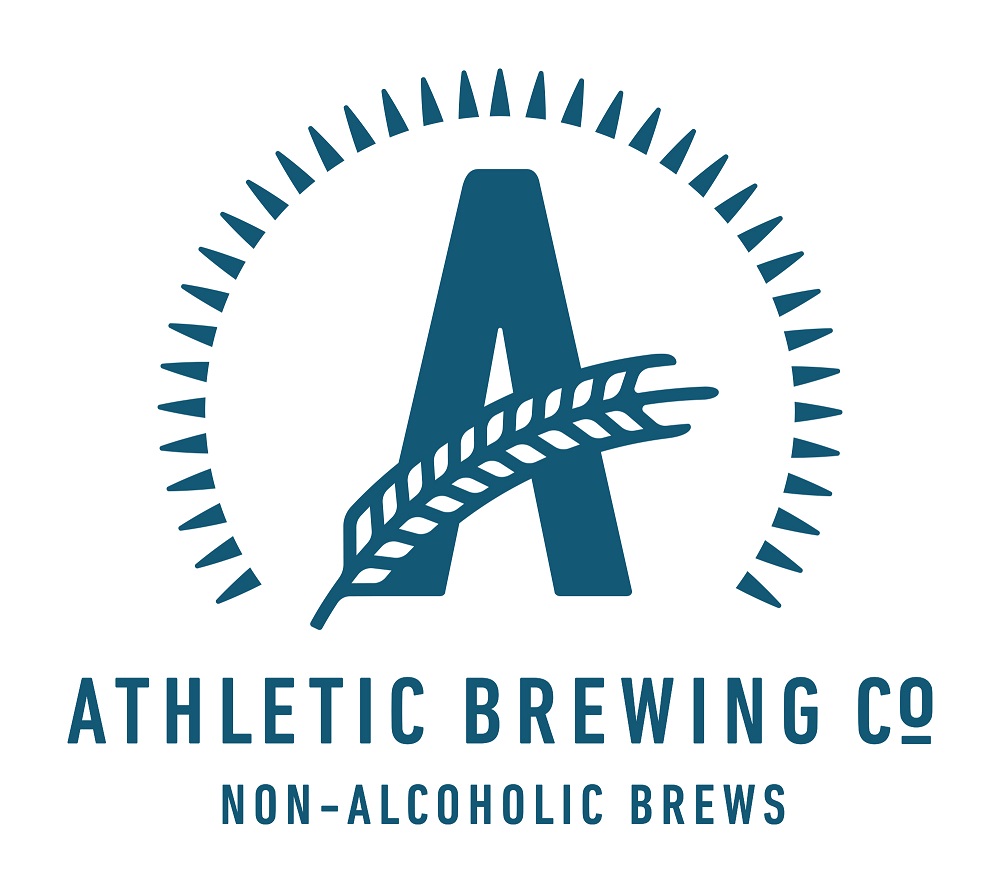
Grand Prize
“I Can and I Will” by Amanda “Ralph” Hughes
I stood at the bottom of Mansfield trying to process the weather report. The women from yesterday echoed in my head “There is a significant amount of rain on Friday!” In the moment, I laughed, shared my appreciation and offered words of reassurance. Then another warning as I passed a woman leaving Johnson. She rolled down her window, and we chatted. She mentioned the storms and I reassured her. I couldn’t stop at the bottom of Mansfield, I had started to feel good.
My first days southbound on the Long Trail were grueling. I had thrown up at the top of Doll Peak. Sat through thunderstorms on top of Butternut Mountain. I am convinced that Haystack tried to kill me. I couldn’t stop at Mansfield.
I hurried up to the gondola ticket booth and asked for a ticket. She looked at me and said “I’m not going to tell you what to do, but I would not feel right sending you up there. They are calling for catastrophic flooding. You will get up there, but not down.”
I went with the local advice, despite wanting nothing more than to push on. I found a ride to town and a place to stay. The torrential rain started at around 4 p.m. I kept thinking “I could have made it to Butler.”
I woke up early the next day and looked outside. The driveway was flooded. The river had burst its banks and furniture and full trees were floating down. I went to find coffee in the lobby, the woman behind the counter was crying. She shared that her best friend’s home was underwater, a single mother. She lost everything.
I now knew I needed to leave the trail.
I got a ride back to Burlington. As we drove, I saw the destruction all around me. The community that had taken me under their wing was hurting. I felt helpless.
As the following days unfolded, stories of hikers that had become stranded after attempting to cross blown out creeks began to come out. They couldn’t get off the trail. I was thankful I made it off when I did, but heartbroken.
Like the community in Vermont, I worked to heal and accept my choice. And this year, I will finish the Long Trail. I can and I will.
Day Hike Category Winner
“Turning Back, Turning Within” by Matty “Faceless” Adams
It is easy to do, to fall into the trap where you believe the summit is the whole point. I have been turned back by a surprise whiteout, by heat exhaustion, by a companion’s twisted ankle, by running out of water, time, daylight, or willpower. I hike with more possibilities now.
On an August morning I found myself parking the only car at the Bluff Mountain trailhead in Brighton, Vermont. I had a destination in mind: the two summits named Bluff Mountain, the south one first, then her twin, 13 feet shorter and a mile further. I also had a mission to take a picture of the Nulhegan Basin sprawling below and to the east.
I climbed the challenging iron rungs and spied the town of Island Pond through a cleft in the trees. I made my way through the increasingly overgrown trail, up and up. Lanced by briars, my feet covered in muck, I pushed on. To the west I caught a narrow view, noting a bruise-colored thunderstorm in the distance. Upwards still I went.
I passed through tight spruce and hardwood groves, and glades overgrown with chest-high prickers. I kept alert for moose and bear. The wind changed. The air noticeably cooled, darkened. I was now racing a storm, high on its target ridge, when I found the first summit completely forested. Rain hit the storm-tossed canopy. No view, no photo. I reversed direction.
At the briary glen the storm abruptly shifted course. Glistening red raspberries appeared. I casually grazed. Continuing, I came to a perfect stone staircase leading through a ledge. Later, I found a spring arising from a stone fissure. Not disappointed, my journey felt whole, satisfying.
All this made me remember my first time up New Hampshire’s Mt. Monadnock. I was just six. Dad’s colleague, Mr. Bailey shouted, “If weren’t for you and your knapsack, Carl, Matthew and I would be at the top by now!”
Was it the knapsack, Dad? Or were you silently soaking in the autumn aromas of dried leaves, that apple you carried? Or had the hike ushered in memories for you, of summiting Katadin, canoeing the Allagash? You must have known there is no defeat in turning back.
To the contrary, it is a special success. Look closely at the footpath, stop to eat berries, and know it’s the journey that changes you, not the destination.
Section/Thru Hike Category Winner
“The Universe Doesn’t Want Me to Finish This Hike!” by Tim “Porkie” Bennett
In July of 2022 I began an end-to-end hike of the Long Trail to celebrate my recent retirement and to honor my father’s legacy. In 1937, he hiked the Long Trail from Sherburne Pass to Bolton to celebrate his high school graduation. Armed with his 1937 trail journal, I planned to retrace his steps and compare journeys. But the universe seemed to have other ideas. My plan was interrupted when I was struck by a car crossing Route 4 at Sherburne Pass.
The accident was devastating. My injuries were serious, but after great medical care, I was able to return to the LT a year later. I made it as far as Montclair Glen Lodge before the universe intervened again. This time, it was rain. Lots of rain. Catastrophic flooding rains.
I don’t mind hiking in the rain, but this was different. The major storm created dangerous conditions that forced me to carefully consider how and when to continue. There were plenty of reasons to bail out, assuming I could safely get off the mountain. Some parts of the trail were within my abilities, while others were a bit of a push. That’s the confounding thing about the Long Trail. One minute I’m feeling great, my feet powering towards Canada. The next I’m flat on my back in a mud puddle trying to figure out what happened.
After sheltering at Montclair Glen for two days, the weather broke. I was able to climb Camel’s Hump and make it to the Winooski River. That’s where my father’s journey ended, so there was a sense of accomplishment. And I was safe!
In the aftermath of the floods, the GMC recommended that hikers come off the trail. I wanted to finish the Long Trail but needed to be smart about it. The universe didn’t force my hand this time, it just strongly suggested that it was time to quit. The choice was mine. Do I really need to hike to Canada? I’ve got nothing left to prove. I can head home instead. So that’s what I did.
During my trip home, the GMC announced the LT was reopened. Arrrrgh… Now the universe was just teasing me! But heading home was the right call. There’s no need to continue. I can take a hint. The universe doesn’t want me to finish.
A few weeks later, I defied the universe and hiked to Journey’s End!
Honorable Mentions:
“Rolling with the Punches” by Heinz Trebitz
Turning Around has a bad connotation: “Defeat”. I prefer Plan B, or Rolling with the Punches.
When you paddle white water, you learn to move with a rapid’s flow. If you try to force your way against it, you’ll flip. You might come up with a kayak roll. If you don’t, it’s a wet exit and heading for the riverbank and (hopefully) a dry towel. You might feel defeated, but in the end, you know you’ve not been good enough.
When you hike or climb mountains, that instant feedback is often missing. It may take hours until you find out you’ve made the wrong decision. By that time, it may be too late.
My “Plan B” story? On hiking the Presidential circuit in the White Mountains, a trip of about 18 miles, we were slower than expected. Not to worry – it was a wonderful July day and there would be a full moon. When we came off Mt. Madison there were still two hours to hike until we’d reach Pinkham Notch. It had turned dark, and even though the moon was out, its light didn’t reach the trail under the wood canopy. No help with lighting from the sky. Of course we had head lamps. But the battery of one petered out after 30 minutes. I had to hold my lamp low to shine on the trail for my companion. No way to search for blazes. At one time it took me 15 minutes to spot the white rectangle on a tree. What would we do if my head lamp went dark, too?
Entered Plan B: The AT conveniently crosses the auto road up Mt. Washington. When we reached it, we decided to hike down to Route 16, rather than continuing to Pinkham Notch.
With the full moon’s light on the open road we made it down safely and got a ride to Pinkham and our car. It was 3 in the morning when we arrived home in Vermont.
Defeat? In a way, yes: we didn’t finish our hike as planned. But we avoided real trouble and a possible bivouac. And actually, we had not turned around.
Emilie Noelle Provost
In August 2021, my husband and I had recently finished hiking all 48 of New Hampshire’s 4,000-footers. We wanted to try something different, so we made a reservation at a hotel in Williston with the intention of hiking Camels Hump.
We decided to hike the mountain from the Long Trail trailhead in Duxbury. This was during the COVID-19 surge in people recreating outdoors, so we figured it would be less crowded than the Monroe Trail, given that it was longer and had more elevation gain. That was our first mistake.
Our second mistake was misjudging the weather. It was a hot, humid day, the sort of conditions that make you sweat out half your body weight every few hours.
When we got to the trailhead, we were happy to see that there were only a few other cars in the lot. As we were getting our packs ready, I spotted a thin white worm emerging from the ground by our feet. I’d never seen anything like it. It looked like a piece of spaghetti, and it just kept getting longer. It was terrifying. This was the first bad sign.
The hike was steep, rocky, and wet, but we were in good shape, so we didn’t have any trouble at first. But soon we encountered sections of trail that were submerged in water. These areas had frogs living in them. Frogs are supposed to live in ponds, not on hiking trails. Bad sign number two.
By the time we’d gone three miles, we’d already consumed two of our four Nalgenes of water.
Four miles in, we encountered three through-hikers. One of them was actively bleeding from a nasty wound on his leg. A short while later, we came across two young women. One of them had just fallen, her right hand swollen to the size of a baseball glove. We gave her an ice pack and some Advil. Bad signs three and four.
The last straw came at the Alpine Trail junction, less than a mile from the summit. We had one Nalgene of water left between us. The heat was unbearable. I turned around and saw my husband lying on the ground. “I can’t take this anymore,” he said. “We’re turning around,” I said.
It took us four hours to get back to the car, but we got there in one piece.”
“The Kindness of Strangers” by Robert “Dadzo” Summer
It was the first year of covid, August of 2020. My three daughters and brother in-law were working on our sixth consecutive summer section hiking the Long Trail. Kaia was thirteen, Ruby eleven and Eliza nine. On our fourth night of a planned five-night trip, we bunked at Suckerbrook shelter. The next morning, while packing up, Kaia tried removing a water bag from a tree branch only to have a piece of bark fall in her eye. With Kaia in a lot of pain, a kind hiker offered to use his contact solution to flush her eye. We decided to cut short our trip and take a side trail to the road to find help. The three girls walked with Kaia in the middle so she could hold their hands and keep her eyes closed. Uncle Rob and I hiked ahead to get cell service to call for help. Finally, we reached a dirt road but still no service. A Massachusetts plate car flew by us despite our raised hands. Then we saw a Vermont plate on a slow-moving SUV. Local cook Cappy cut short his search for a fishing spot and offered to drive my brother-in-law to the road so he could get cell service. Rob called a trail angel and the Middlebury emergency number. Within ten minutes, police, the trail angel, and the ambulance arrived. After the EMT’s tried flushing Kaia’s eye, they recommended we go to Middlebury hospital. The policeman cheered up Kaia joking about how when he gets something in his eye his wife calls him a big baby. Cappy offered to drive Rob and the two younger girls to one of our cars about thirty minutes away. Cappy told Rob he wouldn’t accept any money for gas, explaining it was “his good deed for the day.” He told comical stories about working with kids at Sugarbush resort. One EMT related stories of his LT hiking days to me as the ambulance siren blared. He and his buddies hiked the whole trail in twenty-four days! The ER Doctor said nothing was in the eye, but Kaia had a scratched cornea, and it would feel like something was still in the eye for a while. After giving us some eyedrops, she directed us to a creemee stand to help Kaia, and all of us, recover. I am forever grateful for the kindness of strangers in Vermont!
Brandon Elgun
“I knew I was going to make it to Katahdin by the time I crossed into Vermont on my 2023 Appalachian Trail attempt. I had had my doubts prior to and throughout my hike, but as I got closer to Maine, I was feeling confident that nothing short of a catastrophic injury was going to stop me.
I was in Connecticut when the first of many heavy rains came- I heeded the warnings to get off trail and allow trail crews to assess the damage. Perfect timing for me to get my own damage assessed. The pain in my knee that started only a few weeks in had intensified so much that I thought I’d have to end my hike. A cortisone injection, a serious brace, and a promise to go slower had me back on the trail. I’d already weathered having to get off trail just weeks earlier after finding out that I’d lost my apartment back home in Brooklyn. I stashed my belongings in my friend’s garage upstate and continued where I left off.
Something shifted during the last few weeks on trail. Crossing into Maine, I was disturbed by my lack of emotion. No excitement; no elation that normally would carry me for several days when I’d cross into each new state. I felt nothing. I was becoming increasingly aware that I was experiencing cognitive challenges, likely brought on by malnutrition. Seemingly simple decisions became impossible. I was falling more frequently and my shins were bloodied from struggling to lift my legs enough. I was exhausted and depleted. Worsening weather with no end in sight was crushingly demoralizing. Something wasn’t right. It wasn’t safe to continue.
I made the gut-wrenching decision to end my thru-hike at Grafton Notch in Maine, a mere 267.4 miles from the famed sign atop Mount Katahdin marking the northern terminus. It has taken a lot of time to not think of my hike as a failure. It will take a lot more time to process everything I learned. What I can say is this: I learned that I can trust myself to know when to push hard and hike on, and more importantly, when to turn back. I can trust myself to keep my best interest in mind. And I can trust myself to find my way back to the trail for another attempt, if that is what my heart wants.
“Turning Back” by Frank Vandervort
“What do you think we should do?” asked Frank, my hiking companion and friend of thirty-five years, sweat cascading down his face. His fifty-six years apparent on it.
“If it were up to me,” I replied, “we never would have left.”
We had departed that morning—the third day of a planned week-long section hike of the Long Trail—from Greenwall with Governor Clement as our destination, a suitably modest goal for middle-aged backpackers from flat Michigan. But the previous night had been hot and muggy, the mosquitoes unusually bothersome. We’d slept poorly. At sunrise, the sky threatened rain and the viscous air lay like a wet rag against the skin. Almost from the day’s first step, he had struggled.
We moved slowly through the morning, picking our way up to Airport Lookout then down into Clarendon Gorge. We took frequent and long rest breaks, Frank mopping sweat and chugging water. He was pale and obviously weak. It seemed clear that we were not going to make our goal for the day.
But as a young man he’d been an army M.P., and later competed in marathons and triathlons. He was used to pushing himself to the brink of physical exhaustion. The idea of quitting, of turning back, anathema to him. So after he regained a bit of strength, we started up the deep crevasse that leads out of the gorge with Frank leading. Despite the cooler air emanating from the wall of rock, after only a couple minutes, he sat down again, sucking wind.
Slowly, we made our way to Clarendon Shelter, where we ate lunch. Frank napped and drank bottles of water in which he mixed powered Propel that a ridge runner had given him. After three hours, we started north again. Only then, when rest and rehydration had not improved his condition, did he turn and ask my opinion.
We returned to the shelter, then home. It turned out that newly prescribed cholesterol medication had triggered severe dehydration. This trail forgives no hubris—one careless step or a refusal to recognize one’s limits—and an adventure can turn tragic. We must heed the mountains’ message. Had we not turned back, his condition may have grown critical
But the following year we were back, and completed another section. A year later than planned, we reached Journey’s End, realizing our goal of completing the Long Trail.
The contest closed to entries on March 9, 2024.
We’re hosting a hiking essay contest! One key tenant of hiker safety is knowing when to turn around, when pushing on to an intended summit or destination presents risk factors. To spread this message, GMC wants to hear your stories of when success meant calling it early or turning around. What happened – what went according to plan and what didn’t? How did you make the decision to stop early or turn around? What did you learn from turning around? Your personal narratives could be featured as part of a collection in the summer Long Trail News.
Please share stories of no more than 400 words, and photos if you have them. GMC may edit your submissions for length or clarity. In addition to the summary, please be sure to include the name and ages of those in the hiking party, approximate date/time of year of the hike in question, and the trail in question. Hikes in question should take place in Vermont, on the LT, AT, or NEK trails, though we may consider compelling stories from greater New England and Adirondack hikes.
We are looking for:
First-person narratives of the time you turned around or “quit” a hike early, and why. These hikes can occur in all seasons – winter, summer, shoulder — and pertain to hikes of any length or difficulty. Word count limit is 400. Submissions are due no later than Saturday, March 9.
What You’ll Win:
One grand prize winner will win a Custom Burrows hoodie from Vermont-made Thuja. ($110 value).
One Category Winner in each of the following categories will win a GMC bundle: shirt of their choice, gray GMC beanie, and custom Buff:
- Youth Authors (under 18)
- Thru-Hikes gone awry
- Day Hikes gone awry
We will print a selection of our favorite stories in the Summer 2024 Long Trail News, alongside the list of the new class of Long Trail End-to-Enders. Stories will be reprinted on our blog and social media. One entry per person, please. Use the submission form below. For troubleshooting or questions, please contact Long Trail News Editor Chloe Miller at [email protected]
The contest closed to entries on March 9.





















